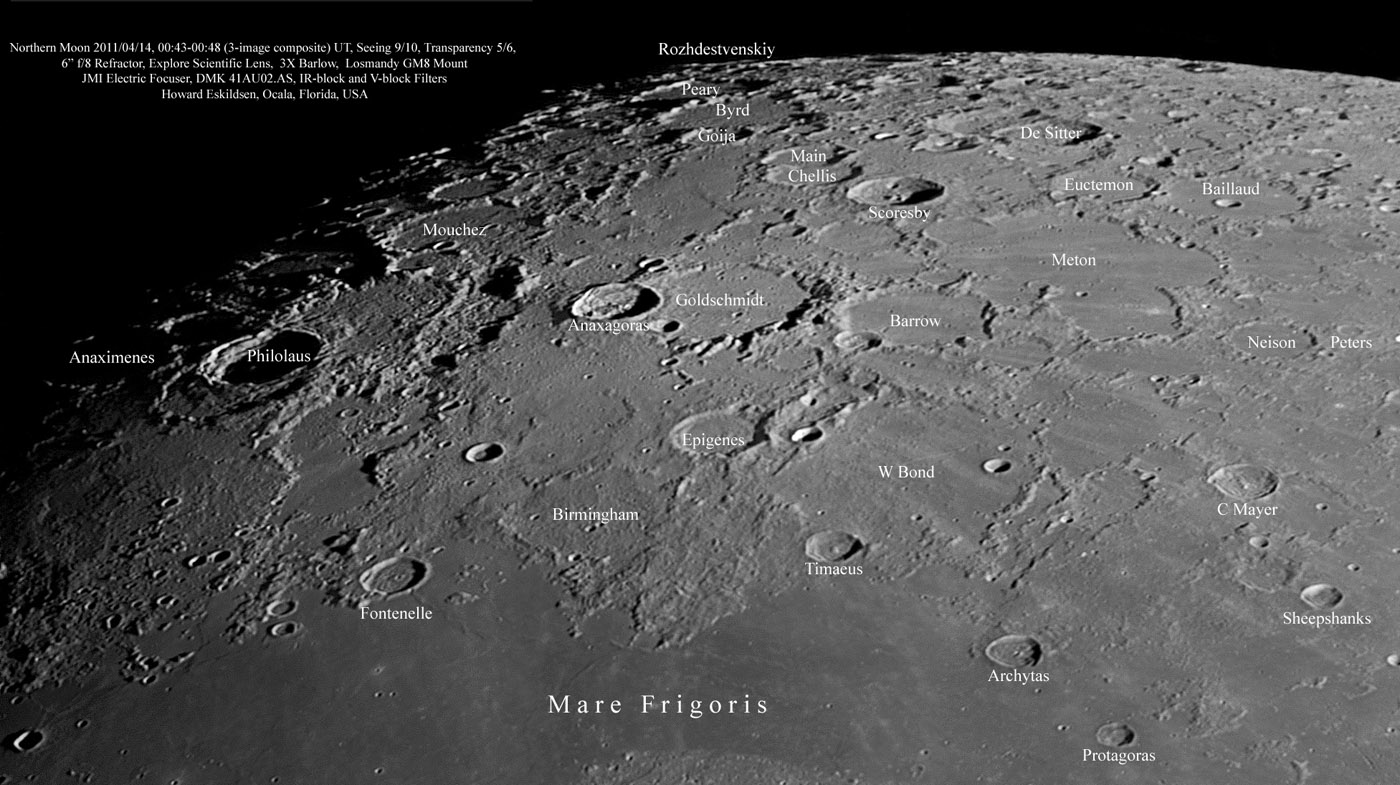Difference between revisions of "May 6, 2011"
| (2 intermediate revisions by the same user not shown) | |||
| Line 6: | Line 6: | ||
<em>image by [mailto:howardeskildsen@msn.com Howard Eskildsen]</em><br /> | <em>image by [mailto:howardeskildsen@msn.com Howard Eskildsen]</em><br /> | ||
<br /> | <br /> | ||
| − | Do you not get lost but can't always remember the names of features near the north pole? | + | Do you not get lost but can't always remember the names of features near the north pole? |
| − | If so, this LPOD will be a convenient image map to keep handy. The freshest distinctive | + | If so, this LPOD will be a convenient image map to keep handy. The freshest distinctive |
| − | crater in this area is Anaxagoras, bright with rays once away from the terminator. Howard's | + | crater in this area is Anaxagoras, bright with rays once away from the terminator. Howard's |
| − | image nicely shows the broad swath of terrain where all the craters have shallow and | + | image nicely shows the broad swath of terrain where all the craters have shallow and |
| − | rather flat floors. The boundary to the west seems quite sharp, running from Byrd to | + | rather flat floors. The boundary to the west seems quite sharp, running from Byrd to Birmingham, but the east edge is more jagged running roughly from Baillaund to W. Bond. This |
| − | + | is an area where ejecta from the formation of the Imbrium Basin filled in existing craters. | |
| − | is an area where ejecta from the formation of the Imbrium Basin filled in existing craters. | + | Meton is an interesting example, for apparently it was originally three or four separate craters |
| − | Meton is an interesting example, for apparently it was originally three or four separate craters | + | whose common walls were destroyed, creating a large and irregularly walled plain. What |
| − | whose common walls were destroyed, creating a large and irregularly walled plain. What | + | destroyed the common walls but not the perimeter ones? |
| − | destroyed the common walls but not the perimeter ones?<br /> | + | <br /> |
<br /> | <br /> | ||
<em>[mailto:tychocrater@yahoo.com Chuck Wood]</em><br /> | <em>[mailto:tychocrater@yahoo.com Chuck Wood]</em><br /> | ||
<br /> | <br /> | ||
<strong>Related Links</strong><br /> | <strong>Related Links</strong><br /> | ||
| − | Rükl plate [ | + | Rükl plate [https://the-moon.us/wiki/R%C3%BCkl_4 4]<br /> |
<br /> | <br /> | ||
| + | <hr /> | ||
<p><b>Yesterday's LPOD:</b> [[May 5, 2011|Beyond the Past]] </p> | <p><b>Yesterday's LPOD:</b> [[May 5, 2011|Beyond the Past]] </p> | ||
<p><b>Tomorrow's LPOD:</b> [[May 7, 2011|Great Rainbow]] </p> | <p><b>Tomorrow's LPOD:</b> [[May 7, 2011|Great Rainbow]] </p> | ||
| − | < | + | <!-- End of content --> |
{{wiki/ArticleFooter}} | {{wiki/ArticleFooter}} | ||
Latest revision as of 17:53, 13 October 2018
Beyond Frigoris

image by Howard Eskildsen
Do you not get lost but can't always remember the names of features near the north pole?
If so, this LPOD will be a convenient image map to keep handy. The freshest distinctive
crater in this area is Anaxagoras, bright with rays once away from the terminator. Howard's
image nicely shows the broad swath of terrain where all the craters have shallow and
rather flat floors. The boundary to the west seems quite sharp, running from Byrd to Birmingham, but the east edge is more jagged running roughly from Baillaund to W. Bond. This
is an area where ejecta from the formation of the Imbrium Basin filled in existing craters.
Meton is an interesting example, for apparently it was originally three or four separate craters
whose common walls were destroyed, creating a large and irregularly walled plain. What
destroyed the common walls but not the perimeter ones?
Chuck Wood
Related Links
Rükl plate 4
Yesterday's LPOD: Beyond the Past
Tomorrow's LPOD: Great Rainbow
COMMENTS?
Register, Log in, and join in the comments.



